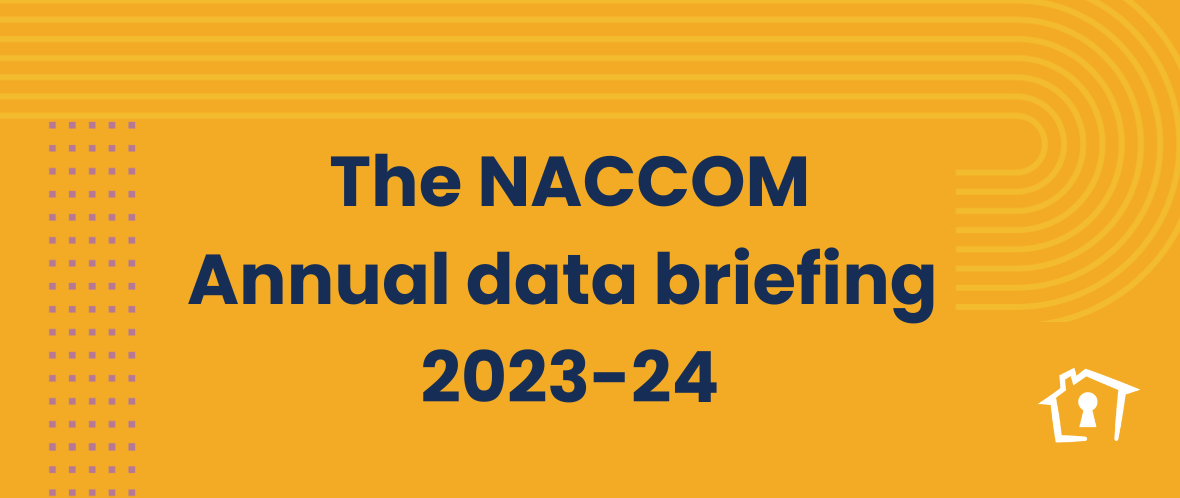
NACCOM’s latest Annual Survey data reveals that destitution and homelessness in migrant and refugee communities are on the rise in the UK, with thousands of people in the asylum and wider immigration system routinely experiencing trauma and hardship.
Our annual data briefing, Understanding destitution and homelessness in the asylum and immigration system, paints a comprehensive – and shocking – picture of the extent, impact and root causes of migrant destitution and homelessness in 2023/2024, and shines a spotlight on the increasing complexity of service provision in the sector, as voluntary organisations adapt to a turbulent policy landscape.
A hostile and failing asylum and immigration system, coupled with a chronic lack of social and affordable housing, and a general increase in demand for emergency homelessness assistance, are driving up levels of destitution and homelessness in migrant communities. NACCOM’s inspiring and dedicated frontline members continue to provide a vital safety net, but local capacity often can’t meet soaring demand, and unsustainable pressure is being placed on the voluntary sector – a bold programme of action is needed.
The briefing also lays out a set of recommendations for policy reform to ensure that the asylum and immigration system doesn’t actively drive up levels of destitution and homelessness, as it is currently doing.
Key findings and insights from the briefing:

- The network provided accommodation, ranging from hosting and lodging placements to housing schemes and emergency accommodation including night shelters, for 11% more people than last year, and 82% more than in 2021/22.
- For the second year running, the network accommodated more people than in any previous year, supporting a total of 4,146 people.
- More refugees are being unjustly forced to turn to the voluntary sector for accommodation and support when they have been granted refugee protection by the state and are legally entitled to statutory support.
- In 2023-24, NACCOM’s members accommodated 1,941 refugee adults experiencing homelessness, a 99% increase on last year, and the largest cohort of refugees the NACCOM network has ever accommodated.
- There was a 129% rise in the number of people who entered members’ support directly after leaving Home Office accommodation.


- Members report a sharp increase of 125% in rough sleeping, particularly amongst new refugees, forcing many to re-think their emergency accommodation provision, ranging from the opening of new night shelters, to booking hotel rooms. Local demand was often greater than capacity.
- Several NACCOM members describe having to distribute rough sleeping packs, including tents and sleeping bags, for the first time for refugee rough sleepers.
- For the first time, NACCOM members collectively provided over half a million nights of accommodation (501,371 nights in total).
- This shows the growing extent to which the voluntary sector provides a safety net for people who fall through the gaps in the asylum and immigration system, stepping in when statutory support fails or is withdrawn.


- This year, 1,257 people with No Recourse to Public Funds (NRPF) were accommodated by the network. Just over half had been refused asylum and were Appeal Rights Exhausted (ARE).
- 236 people were supported to lodge a ‘fresh’ asylum claim after an initial refusal, while many others were supported to move on from homelessness by accessing support provided by the Home Office or Local Authorities.
- This year, our members had to turn away more people than ever before. Despite incredible efforts, they were unable to accommodate 4,151 people – an increase of 83% from last year. This figure is likely to be a severe underestimation of the true scale of unmet need.

Bridget Young, Director of NACCOM, said;
“Our research shows that thousands of people each year are needlessly pushed into destitution and homelessness as they go through the asylum and immigration system. No one should have to experience trauma, hardship and injustice simply because of their immigration status, but this is the reality for so many.
“Every member of our communities should be able to thrive, not just survive, but that’s impossible when you don’t have a safe or stable home, or enough to eat. Urgent change is needed to ensure that the asylum and immigration system doesn’t keep driving up levels of destitution and homelessness, and fuelling injustice in refugee and migrant communities.”



